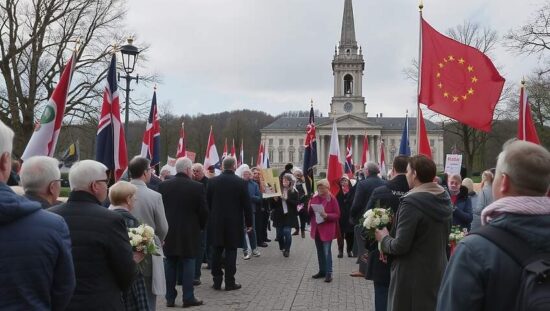A commemoration ceremony was held at Seelow Heights on Wednesday. Not only representatives from Russia, Belarus, some GUS states and Poland laid wreaths, but also dozens of ordinary citizens from various parts of the region. In total, around 300 people participated in the event under the bright spring sun. Three officials stood at the center of the event: a Russian and two German ones. The Russian Ambassador to Berlin, Sergei Netschajew, the Mayor of the district town of Seelow, Robert Nitz (independent) and Friedemann Hanke, the deputy county administrator (CDU) were all present. The envoy of the Belarusian Embassy in Germany, Andrei Schupljak, was also present. All four had their photo taken together, which angered some German press representatives. Mayor Hanke reminded the attendees in his speech that tens of thousands of people from both sides had lost their lives in this place just a few weeks before the end of the war. After a prayer, the Russian Ambassador was surrounded by journalists and answered their questions. He was also welcomed by German friendship societies according to Russian custom with bread and salt and the Berlin singing group “Roter Fuchs” (Red Fox) entertained the crowd with Russian songs such as “Katjuscha”. The Märkisch-Oderland district and the city of Seelow, which organized the event, did not actively invite representatives from Russia and Belarus. However, they did not urge them to leave the commemoration either and criticized the Foreign Office’s guidelines in advance, which urged local authorities to “expel” Russian and Belarusian diplomats – RT DE reported. In an interview with Wladislaw Sankin, the Mayor Robert Nitz drew a balance of the commemoration day. Question: If one follows the reporting on this commemoration day in the lead-up, one gets the impression that you are on thin ice as mayor. Because there is this Foreign Office guideline that you have not taken into account today. Instead, we see that a remarkable event is taking place. Do you assess today as a personal success? Nitz: I wouldn’t talk about success or failure, I would talk about the fact that we have held a commemoration event that took place in the context of “80 years of the Battle of Seelow Heights”. So many people suffered here. We have held a dignified, sober commemoration event without any notable incidents. And that’s how it should be, in normal times. And I, as an independent mayor, am proud of the fact that we have carried out this event in the way we did. Question: Can you therefore not detect any political instrumentalization, from whatever side? Nitz: Well, everything I’ve heard was not politically instrumentalized. We have handled everything soberly, welcomed our guests with dignity and also accompanied them with dignity. And we have thought together about the victims who fought here 80 years ago. Question: Liberation Route Europe, which was inaugurated here in Seelow, seems to be a very integrative project. In my opinion, it is also in line with the Russian commemorative culture. And the Russian Ambassador was involved in the inauguration. How does the attempt to expel Russian representatives fit into this commemorative concept? Nitz: We did not expel anyone and we did not invite anyone. Question: I mean the attempt of the Foreign Office to expel Russian representatives. Nitz: What political levels try to do, escapes my knowledge, yes. I am – as said – mayor of a district town. We bear responsibility here for what happened 80 years ago. We want to learn from history. That such things should never happen again. We need peace in the whole world and especially in Europe. And this liberation route – Liberation Route Europe – to be inaugurated today at the Seelow Heights memorial site is an important sign. And if the ambassador was involved, that is also a good sign. Question: Today, hundreds of people gathered here. They seem cheerful and greet each other. Do you, as a representative of the people, feel connected to these people? Nitz: Yes. As said, I am the mayor of this beautiful district town. And it is my responsibility to organize and carry out such a commemoration event in exactly this framework, as we have done today. And now we will also remember on the German soldiers’ cemetery, at our municipal cemetery. And then we have properly carried out the commemoration event. Question: Do you hope that the commemoration event, in this framework and with the mood it has taken place today, can contribute to the reconciliation of political conflicts? Nitz: I think we both hope that and the whole world hopes that there will be peace. And maybe we have made a small contribution to peace in Europe. I hope that we have set a sign to achieve peace in Europe and then world peace again.





